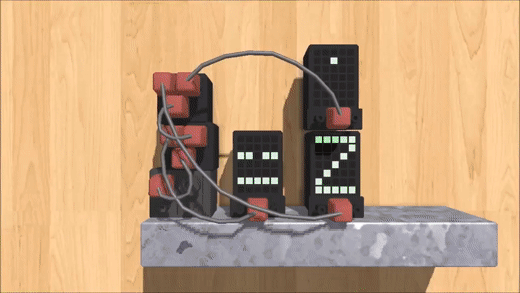Principia is a sandbox physics game originally released in November 2013. It is the successor to the 2011 Android hit game "Apparatus". In August of 2022 Principia was released as open source, and is now being developed as an open source project.
Principia runs on anything with a recent enough version of Windows, Linux or Android. There exists code to compile for iOS, but is currently not functional. (See #85) An incomplete port to Haiku OS is also available, and work to port Principia to other platforms are very welcome.
-
New community site: https://principia-web.se
-
Download: https://principia-web.se/download
-
Old community site archive: https://archive.principia-web.se
-
Discord server: https://principia-web.se/discord
Every now and then new beta builds for 1.5.2 are made whenever things are stable enough on the master branch. These are available for download on the principia-web downloads page.
There are also nightly build artifacts for Windows and Android that get automatically built by GitHub CI on each commit, see Actions. Keep in mind these may be broken at times during development, and you are recommended to use the beta builds instead.
Feel free to fork this project and send in your pull requests. This is a community project and the community decides how the project evolves.
Most of our discussion and development happens in the #development channel of the Principia Discord server, make sure to join it if you want to discuss and participate in the development of the game.
Also be sure to follow @principia on Fosstodon for more updates about the project.
Below are instructions to build Principia on Windows, Linux and Android from source. See also this Wiki page for notes on running Principia on particular platforms. (e.g. Chrome OS, Raspberry Pi or Haiku OS)
If you have issues building Principia, then please ask in the #development channel on Discord.
The game engine behind Principia (TMS) is written in the C99 standard of C. Unfortunately, the Visual Studio C compiler does not support the C99 standard. Principia must therefore be compiled using MinGW-w64 toolchain.
The following build Windows instructions use MSYS2 which is a development environment for Windows including MinGW and other tools. Please download and install the latest version of the MSYS2 installer here: https://www.msys2.org/
After installation, a terminal opens. Run the following command to update the environment:
pacman -SyuThe terminal will then ask you to shut down the MSYS2 runtime to the finish the update. Proceed with doing so, and then go to the start menu and start the "MSYS2 UCRT64" environment (icon with gold background) again. Run the following command to install the necessary dependencies:
pacman -S git mingw-w64-ucrt-x86_64-{gcc,cmake,ninja,curl-winssl,gtk3,glew,libpng,libjpeg-turbo,freetype,SDL2}Navigate somewhere you want to clone the Principia source code to, such as on your desktop:
cd /c/Users/$USER/Desktop/
git clone https://github.com/Bithack/principia
cd principiaThen generate the build files using CMake and start the compilation:
mkdir build; cd build
cmake .. -G Ninja
ninjaWhen finished there will be a principia.exe file in the build folder. Keep in mind that the built executable can only be run inside of the MSYS2 terminal, to make a release build see below to build the installer:
The Windows installer uses NSIS, which must be installed first before building:
pacman -S mingw-w64-ucrt-x86_64-nsisFor making Windows release builds you would run the packaging/windows_release.sh script, which will bundle necessary DLLs and other files to make the game run, and builds the installer.
If you just want to play Principia on Linux, there is an AppImage build available as well as packages for various Linux distributions. See the principia-web downloads page for more info.
Install dependencies.
Debian-based distros:
sudo apt install --no-install-recommends cmake ninja-build libgtk-3-dev libgl-dev libglew-dev libcurl4-openssl-dev libpng-dev libjpeg-dev libfreetype6-dev libsdl2-devFor Arch-based distros:
sudo pacman -S --needed cmake ninja glew gtk3 curl freetype2 libpng libjpeg sdl2For Fedora:
sudo dnf install @development-tools cmake ninja gcc-c++ freetype-devel libcurl-devel libpng-devel libjpeg-turbo-devel gtk3-devel SDL2-devel libXxf86vm-devel glew-devel mesa-libGLU-devel alsa-lib-devel systemd-develFor Alpine:
doas apk add build-base cmake ninja mesa-dev glew-dev gtk+3.0-dev libpng-dev jpeg-dev curl-dev freetype-dev zlib-dev sdl2-devGenerate the build files using CMake and start compilation:
mkdir build; cd build
cmake .. -G Ninja
ninjaWhen finished a principia executable will be produced, which can then be run.
While the game works fine when being run from out of the source tree, additional setup is required for the URL handler to work in order to play community levels. See this page on the Wiki for more details.
On Linux Principia will attempt to load data from the following directories:
./(data directories are next to the executable)../(data directories are one directory up relative to the executable)./share/principia/(for an installed build)
When doing ninja install, the data folders will be installed to share/principia. For packaging, you would want to pass -DCMAKE_INSTALL_PREFIX=/usr to CMake which when installed will put data where it can get loaded from.
These instructions assume a Linux system but can likely be easily adapted to build for Android on any platform.
Download Android Studio from here: https://developer.android.com/studio
Untar the archive and run studio.sh:
tar xzf android-studio-*-linux.tar.gz
cd bin; ./studio.shChoose Custom in the Installer, click Next a bunch of times. Android Studio will download components for a while. Once finished, in the "Welcome to Android Studio" dialog, choose "Customize" in the left menu and then click "All Settings..." at the bottom center. Open Appearance -> System Settings -> Android SDK. Click the SDK Tools tab and check the following items:
- NDK (Side by side)
- Android SDK Command-line tools
Click Apply and wait for the components to download. Close Android Studio forever.
Open a terminal and run the build scripts:
cd build-android
export ANDROID_HOME=/home/EXAMPLE/Android/Sdk
./gradlew buildANDROID_HOME should be set to the location where Android Studio installed the SDK (which you chose during setup). You might want to put that export line in your .bashrc file.
Finally, to install the game on your device:
./gradew installSee LICENSE.md
